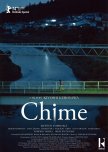
Shocks as sharp as a knife
Keeping its secrets guarded and living off the shocks of its knife-edge turns, Chime sees Kiyoshi Kurosawa covering more than familiar ground with plenty of desolate moodscapes, recognisable for anyone with even a cursory knowledge of his past output. However, there is something particularly chilling about the oppressive mundanity here, a mundanity to which Kōichi Furuya's digital cinematography adds another layer of dread. It's a dreary madness that slowly begins seeping into the life of its character. Despite its skeletal form and brief runtime, the film ends on a fascinating rupture; the previously ambient evil becoming tangible shifts, terrifyingly, within the realm of possibility and the suggestion of this curse being made concrete becomes overbearing. Relishing in the awful psychological residues of violence while suggesting a lucid dream, the kind of fragmented nightmare you are grateful to wake up from but just as terrified to leave so unresolved.Was this review helpful to you?

Rest in peace Kenpachiro Satsuma, your spirit will live eternally.
To say that Godzilla Minus One is my most anticipated movie of the year is a severe understatement. It currently holds the candle for my most anticipated movie ever. The wait has been agonising, less so for my brother who I brought along for what is our first experience seeing Godzilla on the big screen. For the better part of December seeing Letterboxd members gushing about it has been terrifying. But finally, I managed to catch a screening today, 2 days after its UK debut, by god, it was worth every minute, every second... this is the best Godzilla movie to date, bar none.Feeling as if he unfairly cheated death too many times, Shikishima, a surviving Kamikaze pilot is attacked on Odo Island along with many war plane engineers by an enormous monster. After the engineers die due to Shikishima failing to distract the monster, an overwhelming amount of guilt weighs on him, especially after a homeless woman and a baby move into his home when he returns. Shikishima, now on a personal mission, teams up with a large group of veterans to finally take down the monster known only as Godzilla.
Having spent the better part of a week watching Takashi Yamazaki's other directorial efforts certainly didn't prepare me for what he would bring to the table with Minus One. Choosing a post-war setting for the movie invited some rather minor scepticism but the film ended up an extension and refinement of his earlier wartime epic, The Eternal Zero. Tension and redemption run high throughout this film, with everyone seeking a path forward in the face of utter destruction and hopelessness.
Yamazaki's proficiency for human drama was not in question, having watched his Always Sunset trilogy the other week, emotions run high and his characters inject so much life and soul into the picture. It's backed by an utterly terrific script, heartfelt and often awe-inspiring and his calling his direction anything less than superb feels wrong.
I still can't believe that Yamazaki and company pulled this off for the money they had, either Hollywood blows their film budgets in all the wrong places or Japanese VFX artists are severely underpaid for the job they do (maybe it's both). Godzilla is one scary-looking bastard, taking his main influence from the Heisei suits but blown up with scales and spikes added into places you didn't know he had, his presence throughout the film is one of constant overhanging dread, cropping up when the characters least expect him and terrifying all who see him. Seriously, the build-ups to his atomic breath gave me constant goosebumps and seeing him standing amongst the ruins of Ginza just sent shivers down my spine.
I could technically accuse Yamazaki of nepotism given how many of his regulars take on roles here but I'm not going to. Everyone gives it their all, especially given the immense weight they had to carry on their shoulders, everyone is incredible, I can't fault a single performance. Ryunosuke Kamiki especially did a stellar job, the emotional resonance of his dialogue leaves you hanging on every word, Minami Hamabe is the rock to his PTSD-ridded life and the two of them share beautiful chemistry.
Naoki Satō's music is just phenomenal, his music carries so much menace and unease but thoroughly compliments Yamazaki's incredible style, there's a beautiful use of pure silence (especially in the climax) to emphasise both creative forces. His utilisation of the classic Ifukube cues is hands down one of the best of the entire franchise, cropping up at just the right time to not feel out of place or irrelevant.
Godzilla Minus One is truly the first of the franchise to make me truly afraid, the Big G's villainous stance hangs over the picture with a looming dread that remains unshaken even when the credits roll. Putting the trauma of history at its core was an inspired creative choice, evoking the original film more than any other since GMK (which Yamazaki lists as his favourite, based). Everything about this film works and exceeds any expectations I had of it, with its emotional heart just as prevalent as its terror. I'm so glad my brother was along for the ride, no way I was experiencing this alone.
Was this review helpful to you?
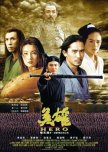
Questionable stance but oh so beautiful
For all of Hero's striking use of colour and landscapes, the drama, characters and ideas are not sufficiently compelling enough to sustain the martial arts. It's easy on the eyes, but too segmented to gather much momentum and too art-directed to convey much urgency. However, I can't deny the result. Both thrilling and thoughtful, offering imaginative and meticulous set pieces as it considers questions of loyalty and the individual's role in history. It is not so much a historical epic as a kind of highly determined ballet: dreamy with bloodless violence, relying less on shades of character than on magnificence of gesture. For all my grievances, the performances of its leads are captivating, Dun Tan's score mesmerising, while Christopher Doyle's photography is overwhelmingly stimulating. Hero is a dazzlingly lensed, highly stylized meditation on heroism even if its ideology is confused.Was this review helpful to you?

An ethereal tapestry
Upon this ancestral stage, even the most virtuous are drawn in by the temptations of Maggie Cheung and Joey Wong. A rich ethereal tapestry of stunning colour, kitsch illusionism and slow-motion eroticism, Green Snake has been on my radar for a while now but little prepared me for how vividly imaginative it would end up being. A profound metaphor for the frailties of humanity and the fallacy of religion, Tsui Hark's take on the White Snake folk tale left him plenty of time to ruminate on what would happen post-1997. The snakes are depicted as creatures simply seeking to live their lives in the human world, but they face denial and persecution from strict societal norms and overzealous individuals enforcing the so-called "natural order." The primary enforcer of these rules is devoted monk, Fa-Hoi, who is also shown to be just as susceptible to desire, anger, and even hypocrisy as the snakes. While the snakes seek love, family, and hope, Fa-Hoi and his Buddhist enforcers are denying the very humanity that they claim to be upholding. Fate, love, sex, hate, religion and desire all play a role in eventually bringing down the world the two snakes attempt to build. The allegory here is obvious, Fa-Hoi’s large red surplice only means one thing: China. Beyond the film's fangs with its messaging, it's directed with all of Tsui's usual flair for the kaleidoscopic that's part art-house wuxia, part softcore smut but all beauty. Bringing weight to the proceedings are fantastic performances from its central trio with Maggie Cheung and Joey Wong turning in gorgeous performances as the sister snakes, while Vincent Zhao gets an equal opportunity to shine when the two ladies aren't bathing in the limelight. The art direction, outstanding musical score and beautiful costume design all add to the spectacle, really I only have slight niggles with the hilariously charming rubber snakes and horrendous early CGI which are thankfully kept to a minimum, other than that, Green Snake is a must-watch.Was this review helpful to you?

Truly mad
Picking up shortly from where the first film left off, A Chinese Ghost Story II is a very entertaining sequel, one that amps up the horror, comedy and special effects wizardry. Providing the same type of action and romance that made the first film so popular, this sequel has its faults because it can't match the first film's originality or ability to surprise. Still, as Tsui Hark's thinly disguised response to Tiananmen Square, the film works wonders, criticising authorities and reflecting on the meaning of hope. This is a film made to go all out to please and thrill an audience. All stops are ignored in this wild rollercoaster, one with stunning colour and photography, wild changes of pace and characters suddenly and unexpectedly changing form all over the place. Surrealistic scenes, gorgeous music, suspenseful situations and imaginative production designs accompany the great performances by the cast. Although A Chinese Ghost Story II is very good, it doesn't quite compete with the amazing beauty of the original, regardless, this is still very worth checking out for something a little bit more mad.Was this review helpful to you?
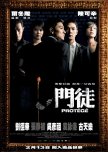
Unflinchingly tense
A gripping, often uncompromising look at the Hong Kong drug trade, Protégé takes a tried and tested storytelling formula and marries it to compelling cinematic finesse caught up in a cobweb of drugs, loyalties and deceit. Mercifully unpretentious, the film is directed with remarkable proficiency by Derek Yee, offering a look at both sides of the drug coin: those who profit from it and those who ultimately suffer from it. By keeping it more personal, Yee's film feels more intimate and urgent, more satisfyingly intriguing, helped in no small regard by its star power. A greyed-up Andy Lau is as great as ever, offering up a sympathetic spin on an otherwise purely business-focused drug lord, while Daniel Wu plays off of Lau with a subtle and controlled rage. With its smart script, solid acting and tight directing Protégé varies from intense drama to dreamlike to subtle shades of black comedy yet never feels like an afterschool special or an obvious morality tale.Was this review helpful to you?

Joe Hisaishi's music destroys me
From its hypnotic style to its pessimistic plot, Sonatine is a mesmerizing manifestation of Takeshi Kitano's continued revitalisation of the yakuza movie. It is a largely peaceful, contemplative work, punctuated by moments of extreme violence all delivered with purpose balancing the fine line between gorgeously dreamy and grim reality. Kitano's haunting elegy to the gangster way of life, he spends the film exposing the gangster ideal as the myth, of little boys who forget to grow up, doing so with incredible flourishes of style, playfulness and jarring outbursts of his trademark humour. Having only written four scenes, the vast majority of the film was largely spontaneous, often Kitano finding his feet in the moment at hand. Sonatine sees the bleak suicidal tendencies of Kitano's mind coming right to the forefront, especially since he suffered partial facial paralysis after a motorscooter accident not long after this film's release. One he has often mentioned was an unconscious suicide attempt, this alone lends a massive amount of weight to the Russian Roulette sequences, giving Sonatine so much more emotional levity to its already unconventional narrative. With the addition of another stunning musical score by Joe Hisaishi, Sonatine rewards those with patience, offering up plenty of existential dread among its exceptional beauty.Was this review helpful to you?
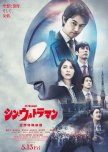
Arigato, Ultraman
I genuinely couldn't wait for a second longer in viewing this, I've been so excited for its release for so long that when some heroes leaked it to the internet during October I was over the moon, yet equally annoyed due to the fact I was already dedicated to Spooky Season at the time. But finally, my time has come and Shin Ultraman is everything I hoped it would be and more.As the threat of giant unidentified lifeforms known as "S-Class Species" worsens in Japan and just when the JSDF and SSSP are pushed to the breaking point, a silver giant appears from beyond Earth's atmosphere.
In this house, we do not stand for Shinji Higuchi erasure, dude had just as much input in the creation of this as Hideaki Anno so it feels morally wrong to completely exclude him from any and all credit he deserves. This film is fucking raw and equally gorgeous, with so many shots of note but the scene of "Ultraman" standing amongst the burning ruins of a city goes hard. Also worth noting is that if you only went to see this or Shin Godzilla due to Anno's name, maybe rethink how you are approaching these movies, just saying.
There's a conscious production design decision by the duo to make Shin Ultraman look as if it was in its genesis and absolutely not concerned with reaching the modern "standards" of polished reboot looks is such a refreshing take. Shin Ultraman looks the part of a brilliant piece of tokusatsu media, a fresh reboot for a new generation and a love letter for long-time fans as both Higuchi and Anno are themselves.
Like Shin Godzilla before it, the visual effects are fantastically stylised. There's a clear love for the original designs and a clever little riff on the reuse of the Shin Godzilla CG model if you know your Ultraman. Shirō Sagisu returns as the composer for the second time, beautifully enhancing the original works of Kunio Miyauchi while adding in works left unused from both Shin Godzilla and of course, fucking Evangelion.
There's so much to be said about the overwhelming success of this film, for a time the highest-grossing film of 2022 in Japan alone and currently sitting at the most commercially successful Ultraman film beating out my beloved Superior 8 Ultra Brothers. It stands tall as one of the finest examples of both a reboot and a piece of Ultraman media, although perhaps not as tall as Brave Love Tiga.
The film doesn't really want to spend time with the politics of its predecessor, as Higuchi has stated in interviews "if we just did the same thing, it's kind of pointless". More power to the man, but the film isn't without a small political commentary on the Japanese government and how they would delineate a situation like this.
There's a little commentary on humanity's place in the universe, and whether we've proven ourselves worthy of continuing as a species. This messaging isn't always elegantly executed but, like so much of the film, it's presented with such enthusiastic sincerity that it's hard to resist. The world may sometimes be a terrible, frightening place, but Shin Ultraman argues that a little decency can still go a long way. I fucking love it, roll on Shin Kamen Rider!
Was this review helpful to you?
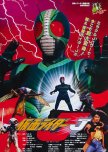
The weaker of the Amemiya duology
Easily the weaker of Keita Amemiya's two Kamen Rider films, but J does many things that ZO doesn't. Kamen Rider J skips out on the backstory of its Rider and instead leaves the questions till later opting for the action-first approach. The creature designs are suitably Amemiya with the direction and music as great as they always are, I could have done without the annoying little sidekick as it felt like Amemiya was trying to draw in a younger crowd with it, given the costume design of Zu it feels like the exact opposite, she possesses considerable dommy energy.Was this review helpful to you?
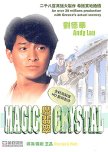
Seriously underrated madness
One part ET, another part Indiana Jones but a Wong Jing movie in every other sense, Magic Crystal has everything and the kitchen sink cheesed up to the max, but dosed on adrenalin too. Wong Jing's signature chaotic direction, balls-to-the-wall pace, brutal stunt work, cheesy yet ridiculously charming effects and humour that ranges from childish to outright offensive but it's presented in such a way that it remains hilarious. Topped off by an incredible cast that includes the likes of Andy Lau, Cynthia Rothrock and an awesomely villainous Richard Norton all of whom commit 100% to the film's stupidity. It's over the top and knows it, delivering endless, ferocious and well-choreographed action all set to a rocking synth score that has become a staple of most 80s Hong Kong movies. Daft, dumb and oh-so-fun, Magic Crystal is one you owe yourself to watch if you are in any way a fan of shlocky excellence. Then again I also gave 5 stars to Future Cops... so you decide.Was this review helpful to you?

Sammo does John Woo
If you only know Sammo Hung for his more happy-go-lucky roles, then Eastern Condors will be a massive shock to the system, going as far as to tread into John Woo's territory of heroic bloodshed. Taking the idea of The Dirty Dozen but setting it in Vietnam, Sammo got serious with this one, even cutting his trademark hair and slimming right down. There are no mincing words about how brutally violent Eastern Condors gets... Hands get chopped off, Vietcong kids play Russian Roulette and people are shot point blank with no hesitation, in the wrong hands it's distasteful stuff, but Sammo treats it all with sincerity, marking this film out as one of his finest accomplishments as an actor, martial artist and director.Although the majority of the action is hyper-intense gun fights occasionally punctuated by a familiar moment seen in Western war films like The Deer Hunter or the Rambo franchise, there is a spectacular final bout of full-contact fisticuffs for the patient ones among you. The cast is populated by plenty of familiar names and faces, although I do wish they got a bit more characterisation outside of their nicknames and who plays them, they all commit often coming away bloody and bruised from the hyper-dangerous stunt work. For better or worse, Eastern Condors has a gritty edge that makes it truly stand out amongst Sammo's filmography often feeling like what Heroes Shed No Tears had originally wanted to be, it's an absolute must-see!
Was this review helpful to you?
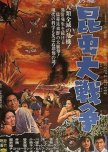
Exhausting
Exceptionally convoluted and deliriously nihilistic, Genocide is appropriately harrowing and periodically bonkers if a little middling around the second act. The second of only two movies from director Kazui Nihonmatsu, having previously helmed The X from Outer Space, Genocide is all over the place with enough hair-brained ideas to fill two movies let alone a single 84-minute one, primarily the hallucinogenic bees being bred by an insane holocaust survivor. Nihonmatsu handles the film with considerably more skill than his prior effort, there's a wider variety of shots and a better building of suspense thanks in part to the photography of Shizuo Hirase and the passable score from Shunsuke Kikuchi. It's very much an accident of a film, suitably ambitious and apocalyptic in its finality, ultimately hinging on the potential detonation of a hydrogen bomb and the single mother who may have to single-handedly repopulate a country. Genocide is an exhausting yet very rewarding experience, showcasing so pretty damn good filmmaking for its small budget but, as noted before, has too much plot for its own good.Was this review helpful to you?

Watch the HK Cut
The answer is Jackie Chan. Who Am I? sees Jackie tackle the amnesiac spy thriller years before the Matt Damon shaky cam series and although a lot of the acting from its supporting cast leaves a lot to be desired (almost to the point of brain dead), the action more than makes up for it. The story feels unnecessarily complex and often messy but makes for an otherwise very compelling mystery (provided you watch the right version) in one of Jackie's more serious turns ala Crime Story. Benny Chan's direction is all pretty solid and Nathan Wang's score is decent if very dated, but seeing it paired with Jackie running around causing mass destruction in the Netherlands all while clad in a pair of clogs was truly a sight to behold. Despite a tepid first half, the film picks up steam with some great action, a fantastic car chase and the usual death-defying stunts in the second, with the rooftop fight easily ranking as one of his best, it's all just as imaginative and energetic as his early works even with Chan's advancing age.Was this review helpful to you?
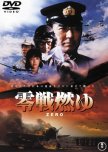
Another one for the “Toshio Masuda is one of Japans most underrated directors” pile.
There's something strangely perfect about Zero being directed by Toshio Masuda, having been kicked out of the kamikaze in 1944 for being excessively liberal and pacifistic. It's a real treat to finally see another one of his war epics after so many years, this time him and him alone in the chair. Based on a serialized story by Kunio Yanagida, this is the story of the Mitsubishi Zero through the eyes of the engineers who designed the plane and the pilots who flew it.Shoichi Hamada is a pilot flying the Imperial Navy's ace in the hole, the Mitsubishi A6M Zero, during the first years of the war the Zero is seemingly unstoppable, shooting down almost every type of plane the allies send at them. Hamada's best friend is Kunio Mizushima, assigned to the ground crew, they are both in love with one girl… but will the ravages of war tear them apart?
Toshio Masuda's direction is simply sublime, taking what worked on Tora! Tora! Tora! over a decade ago and bringing it back tenfold. It is clear Masuda had no love for war and thus directs the film with a dash of gritty realism, unflinching in its portrayal of death, bad decisions and ultimate endeavour for a lost cause. By stark contrast when the film isn't wowing you with its climatic and brutally intense battle sequences, it shines with a glorious use of colour.
The plotting is well done, keeping the story of the Zero first and foremost while framing the story of the young pilot around it. Masuda seemingly backhands the naval authorities for using the pilots as expendable property. In general, the film has no respect for higher authorities, portraying most of them as simply using their soldiers, and not caring about their lives. The story is told in reverse, starting from 1944 and going in reverse to 1937. The pacing is well done, keeping everything at about the same level.
The acting is great on most parts, and even the expats seem to be doing well, it's often noted how poor a lot of them were in Japanese films of the era but here they do a standup job. As for the main characters, they are directed with enthusiasm that goes with their youthfulness. The love triangle is directed well but in a way, it's almost like a precursor to the later Michael Bay shakey-cam fest, Pearl Harbour, ending on that usual "war romance" subversion.
Daijiro Tsutsumi as Hamada brings all sorts of emotions to the table, and by the end, it is clear the Japanese war machine has become him. Kunio Mizushima, played by Jun Hashizume, shows clear concern for his friend as well as a great love for the female love interest, Shizuko Yoshikawa. Shizuko Yoshikawa, herself is a very well-done love interest. She clearly has a mixed bag of emotions for the two leads and loves them both on different levels. Tetsuro Tamba's brief appearance as Isoroku Yamamoto casts him as a very sympathetic man, clearly concerned for the lives of his young pilots despite only appearing for about 5 minutes. Shin Takuma does well as Teruo Tojo, the Zero's financier and Mitsubishi Motors president, showing quite a youthful energy and enthusiasm for his character.
The special effects by later Biollante to Destoroyah Effects Director Koichi Kawakita are very well done, clearly showing off just as much enthusiasm for pyrotechnic effects as his teacher Teruyoshi Nakano. The miniatures look great, and it’s nice to see a few Zero miniatures portrayed accurately as white in the opening 30 minutes. The camera angles during the air battle scenes are daring, and Kawakita makes use of frenetic camera movements during the battle scenes to enhance the combat. There is quite a bit of stock footage in the film, all the way from Storm of the Pacific to Kawakita's own Zero Pilot and to The Imperial Navy, but the original effects all look fantastic and blend very well with Kawakita's efforts.
The music by Harumi Ibe has a dated late 70s-early 80s quality that actually works for the film, and the score uses a lot of horns as well as 70s-style guitar work that make it clear Ibe was primarily used to the 70s style of composing and hadn't quite made the jump to the 80s sound design yet. Even then it's a great score and the film's theme song, Dawn, is sung beautifully by Yujiro Ishihara. Befitting the film's historic ending scene well.
Overall, I can't recommend Zero enough. It's clear how much Toho bought their A-Game in 1984, between this, The Return of Godzilla and Sayonara Jupiter, their tokusatsu efforts were on top form. If you ever get the chance to see it, do so.
Was this review helpful to you?
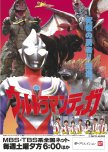
TAKE ME HIGHER!
It's taken me way too long to finish this series and I wanna apologise to my friend Garasharp for that. After small side steps into a few short-lived co-produced Ultra shows, Ultraman returned to his full Japanese roots with Ultraman Tiga marking the debut of a new full-fledged Ultra series and the first full Heisei series.After a franchise hiatus of over 15 years, set in a universe different from all previous series and updated with a new look and feel. Ultraman Tiga is basically one of, if not, the defining Ultra show. You don't need prior knowledge of any of the previous shows to get Tiga, it acts as a fresh start for the series but remains faithful and familiar to the long-time fans.
Where Tiga shines brightest is in its cast of likeable lead characters, raw emotional impact and breathtaking production values. The storytelling is up to the usual Tsuburaya quality with seemingly every episode, for better or worse, developing the characters and their own motivations over the course of the 52-episode run. The slow-burn love story between Daigo and Rena is extremely worthwhile and rewarding for those invested in the series, and the rest of the supporting cast is equally fantastic although Horii can be extremely hit or miss with his comedic antics even then he gets a satisfying and conclusive character arc.
Wildly unpredictable at times with a multitude of excellent episodes under its belt (and yes even some rather dire ones), the series is never lazy. It continues to bring out new and imaginative monsters without feeling the need to recycle and even when an old monster shows up again, it's not without reason.
Unfortunately trying to watch this series in its original format is made nearly impossible due to a long-standing and extremely strict contract with lead actor Hiroshi Nagano's talent agency, Johnny & Associates. There's a great video on why this happened by Vintage Henshin which you should all watch. It's a real shame that due to this, Tiga has been plagued by a lack of reruns, botched home video releases and even suffering from extreme cuts or outright being skipped due to the use of Nagano's own likeness.
The show's production is essentially flawless, the top-notch suitmation work combined with tight direction, scripts and fantastic musical score by Tatsumi Yano. But it's the use of Take Me Higher for the series' opening and often used to accompany the final battles of the episodes where it really gets your heart pumping, unfortunately, it's another casualty of Johnny & Associates' rules due to the fact that Nagano is a member of the band, V6, who perform the song.
There are so many stand-out episodes from the show it's hard to narrow it down to a list of favourites or best episodes, although I will attempt it:
1. The Ultra Star
2. One Vanishing Moment
3. The One Who Inherits the Shadows
4. Zelda's Point Defences
5. Dear Mr Ultraman
6. Take Me Higher! / Master of Darkness / To the Shining Ones
7. The Released Target
8. Second Contact
9. Resurrected Friend
10. Hana
The series has range and it uses it superbly well, be it introducing the first fully evil Ultra of the franchise with Evil Tiga, a self-indulgent love letter to the founding father of Tsuburaya Productions telling a story of how he met the original Ultraman or a scientist trying to live with the grief of his creation that killed his own daughter. There's a multitude of different styles and genres present in this show, catering to everyone and anyone. Even the more kid-focused stories while being the weaker ones are more than worth a look for some rather decent kid acting and storylines.
Ultraman Tiga on the whole distils everything and anything you could want or need out of an Ultraman show. Pure glowing hope and love in the face of Lovecraftian cosmic evil. No matter how dire the situation, it never relents in its depiction of its titular character as a source of optimism. My love for Tokusatsu as a whole can more than be summed up with my love for this show.
Was this review helpful to you?





